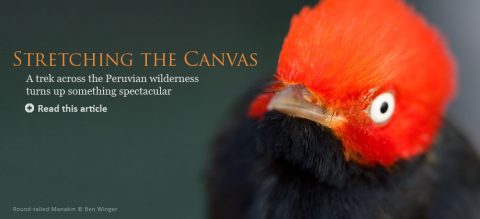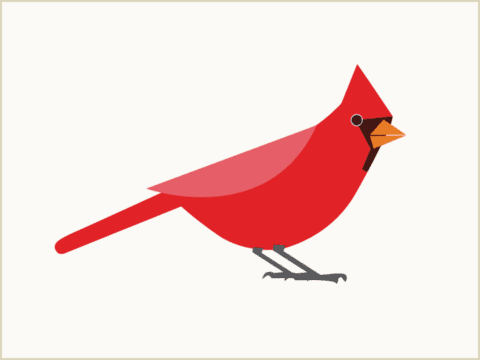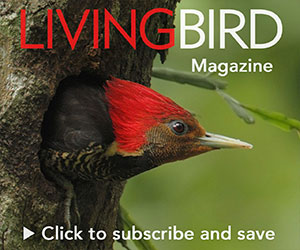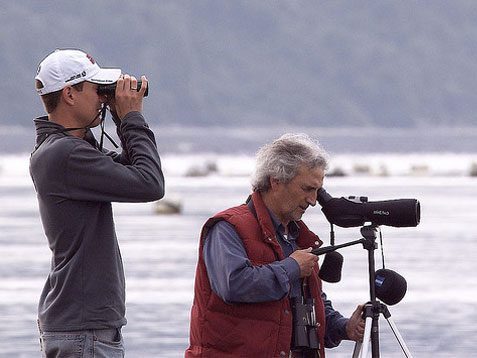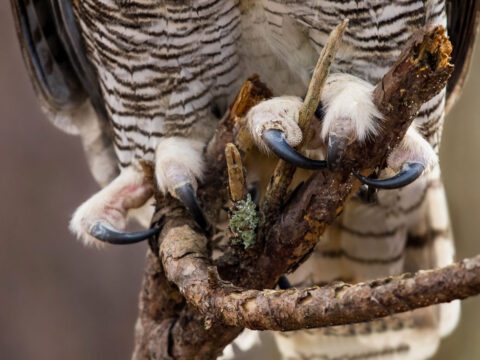Book Review: Life List, by Olivia Gentile
reviewed by Stephen J. Bodio
April 15, 2010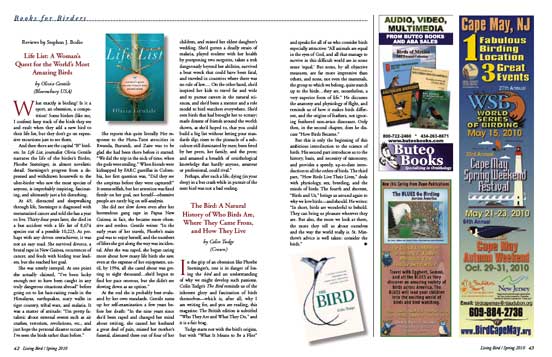
What exactly is birding? Is it a sport, an obsession, a competition? Some birders (like me, I confess) keep track of the birds they see and exult when they add a new bird to their life list, but they don’t go on expensive excursions just to see them.
And then there are the capital “B” birders. In Life List, journalist Olivia Gentile narrates the life of the birder’s Birder, Phoebe Snetsinger, in almost novelistic detail. Snetsinger’s progress from a depressed and withdrawn housewife to the uber-birder who saw the most species of anyone, is improbably inspiring, fascinating, and ultimately just a bit disturbing.
At 49, distracted and sleepwalking through life, Snetsinger is diagnosed with metastasized cancer and told she has a year to live. Thirty-four years later, she died in a bus accident with a life list of 8,674 species out of a possible 10,223. As perhaps with any driven overachiever, it was not an easy road. She survived divorce, a brutal rape in New Guinea, recurrences of cancer, and feuds with birding tour leaders, but she reached her goal.
She was utterly intrepid. At one point she actually claimed, “I’ve been lucky enough not to have been caught in any truly dangerous situations abroad” before going on to list hair-raising roads in the Himalayas, earthquakes, scary walks in tiger country, tribal wars, and malaria. It was a matter of attitude: “I’m pretty fatalistic about external events such as air crashes, terrorism, revolutions, etc., and just hope the personal disaster occurs after I’ve seen the birds rather than before.”
She reports this quite literally. Her response to the Hutu-Tutsi atrocities in Rwanda, Burundi, and Zaire was to be glad she had been there before it started: “We did the trip in the nick of time, when the gods were smiling.” When friends were kidnapped by FARC guerillas in Colombia, her first question was, “Did they see the antpittas before they were captured?” It seems selfish, but her attention was fixed firmly on her goal, not herself—obsessive people are rarely big on self-analysis.
She did not slow down even after her horrendous gang rape in Papua New Guinea; in fact, she became more obsessive and restless. Gentile writes: “In the early years of her travels, Phoebe’s main goal was to enjoy herself, and the numbers of lifers she got along the way was incidental. After she was raped, she began caring more about how many life birds she saw, even at the expense of her enjoyment, until, by 1994, all she cared about was getting to eight thousand…she’d begun to find her pace onerous, but she didn’t see slowing down as an option.”
At the end she is probably best evaluated by her own standards. Gentile sums up her self-examination a few years before her death: “In the nine years since she’d been raped and changed her mind about retiring, she caused her husband a great deal of pain, missed her mother’s funeral, alienated three out of four of her children, and missed her eldest daughter’s wedding. She’d gotten a deadly strain of malaria, played roulette with her health by postponing two surgeries, taken a trek dangerously beyond her abilities, survived a boat wreck that could have been fatal, and traveled in countries where there was no rule of law.… On the other hand, she’d inspired her kids to travel far and wide and to pursue careers in the natural sciences, and she’d been a mentor and a role model to bird watchers everywhere. She’d seen birds that had brought her to ecstasy; made dozens of friends around the world; shown, as she’d hoped to, that you could build a big list without letting your standards slip; risen to the pinnacle of a subculture still dominated by men; been feted by her peers, her family, and the press; and amassed a breadth of ornithological knowledge that hardly anyone, amateur or professional, could rival.”
Perhaps, after such a life, dying (in your sleep) in a bus crash while in pursuit of the next bird was not a bad ending.

All About Birds
is a free resource
Available for everyone,
funded by donors like you
American Kestrel by Blair Dudeck / Macaulay Library
